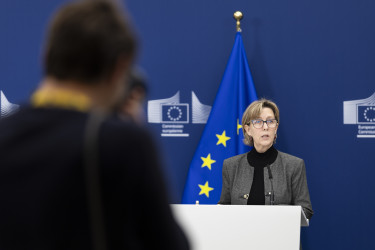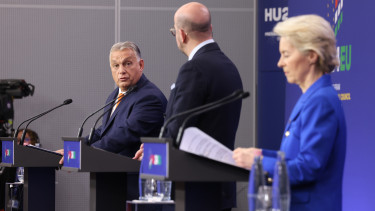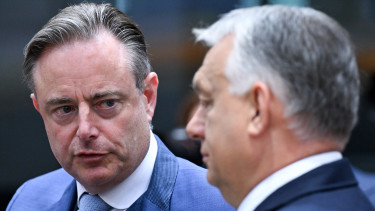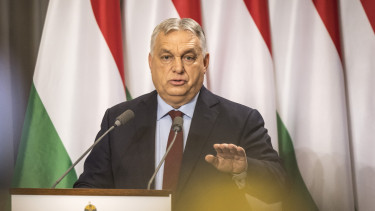EU Commissioner to Portfolio: 'We don't want to take; we want to provide people with profitable investments.'

In the past year, the debate on the Capital Markets Union has gained new momentum. For 20–25 years, the reform has repeatedly appeared on the EU agenda, but a breakthrough has never materialised. Why would this time be any different?
I know exactly how long this has been on the agenda, because I’ve worked on it in many different roles. As a finance minister, a member of parliament, a member of the high-level expert forum, and later as a non-executive director in an investment bank – I’ve seen the project from all sides. And I still believe in it, because this time we are applying a much more comprehensive approach.
We are not focusing solely on capital markets. What we want to create is a full financial ecosystem that works for everyone.
Europeans save a lot of money, but they have very few opportunities or incentives to put their savings to work and achieve higher returns. Our goal is also to complete the Banking Union and to build capital markets that offer better investment opportunities – both for savers and for companies looking for funding.
So the Savings and Investment Union we’re talking about is not a step backwards or a rebranding of the CMU?
It’s actually the other way around. The Capital Markets Union is an integral part of the Savings and Investment Union. We’re still talking about it because it hasn’t been fully delivered yet.
That’s why we are working simultaneously on completing the Banking Union while putting European citizens at the centre of our strategy.
Europeans save more than most other regions, yet they are less wealthy because their savings are not working for them.
Their money is not being put to work. This is also true in Hungary: the savings rate is high, but very few people invest in capital markets for the long term. Compared to Americans – who save less – Europeans accumulate less wealth, simply because they have fewer opportunities and incentives to invest.
And European money is being invested in the United States.
Exactly. That shows that people do want to invest – they just don’t find the right opportunities in Europe. The aim of the Savings and Investment Union is to create those opportunities right here.
We also have excellent companies, innovative projects. If we develop our markets and make them bigger and more attractive, people will be more inclined to keep their money in Europe. Not only would this increase their personal wealth, but it would also contribute to Europe’s economic growth – creating better jobs and higher salaries.
Still, the project continues to face difficulties. If this is such a win-win situation, why are we not making faster progress?
Because even win-win situations can be hard.
One key obstacle is that we still don’t think European enough.
Let me emphasise: we are not trying to create a single supervisor or a single stock exchange. That’s not the goal. But in the current system, our money is kept in 27 different pockets, and we can’t enjoy the benefits of pooling our resources. We need to dismantle the barriers that prevent this.
Let me give you an example: a small or medium-sized enterprise – or even a larger company – wanting to go public will naturally start with its local market, where it is known and trusted. But if it wants to grow, it will need access to a larger market – first regional, and eventually European. That’s why local markets must be dynamic, but also interoperable – meaning they can be easily connected to each other.
This is about integration. We need to remove the barriers that, for instance, lead to different definitions of “shareholder” across countries. That makes cross-border investment harder. Differences in insolvency law or taxation also complicate the picture. I’m not saying everything should be harmonised – but a certain degree of convergence is necessary to realise the full potential of the European market.
This is what the idea of a so-called 28th regime is about.
Yes – even if it doesn’t fall directly under my portfolio.
Ideally, these companies should be able to grow within Europe without needing to seek funding elsewhere. But today, if a company wants to operate across borders, it faces an extremely complex maze of tax, legal and supervisory systems. A single, optional legal framework – which is what the 28th regime could provide – would solve much of this.
In the past, many financial contracts were drawn up under UK law, and that worked fine as long as the UK was part of the EU. But now that it’s not, we need a new solution.
One that isn’t tied to any single Member State but is accepted and functional across the EU.
And in this context, it’s important to recognise that our competitors are not other Europeans – not Hungarians, Portuguese or Germans – but countries outside the EU, like the United States and China. The competition is global.

When I talk to company executives, they say that their biggest problem is not going public, but overregulation, which makes it impossible to make a decent profit in the EU.
If we want to compete with the US or China, we need to compete as Europeans. It’s also true that people often say Europe is overregulated – and yes, that’s partly true. But it’s not just Brussels.
Member States frequently gold-plate the EU’s already complex rules, adding further layers at the national level that make things even more complicated.
If we want simplification – and we do – then everyone has to commit to it: the Commission, the Member States, the European Parliament, national regulators and supervisors. If any of these levels keeps adding new conditions, we won’t reach our goals. That’s why cooperation is essential.
So, if I understand correctly, one of the biggest obstacles is that many Member States are not willing to give up their supervisory powers over financial markets. Is that why we can’t give a broader role to the ECB or ESMA?
There is indeed some resistance to giving up power – that’s human nature. No one likes to lose control.
But I think there’s also a misunderstanding here. What I am advocating is not centralisation. Frankly, I don’t think that would even work. The EU is too diverse, and so are our capital markets.
What I want is that the same question receives the same answer, no matter where it is asked. That’s what I mean by single supervision – not necessarily a single supervisor. These are two different things.
The rules are supposed to be the same, but in practice, they are interpreted and applied differently across Member States. Our goal is that procedures are the same in Budapest, Lisbon or Vilnius. Who does the supervision is secondary – what matters is that the outcome is consistent. This also builds trust between supervisors.
So, essentially, we want to make a common rulebook – and we should also provide a dictionary to go with it?
We already have the rulebook. And maybe we even have the dictionary.
We’re just not forcing anyone to use it – and perhaps “forcing” isn’t the right word anyway. It’s about cooperation.
We have governance mechanisms that allow us to step in when a national supervisor applies the rules in a way that contradicts the legislator’s intention.
We can then give guidance and suggest a different approach. If this is done consistently, we’ll get to a point where the same rules are applied the same way everywhere.
That way, if a market participant supervised in another country wants to enter my market, I can be confident that they comply with the same standards I would apply. That’s how mutual trust is created.
How do you see the willingness of Member States to adopt this new perspective? Can we bring all 27 on board – or are we heading toward a smaller-scale solution, like the French–German “mini” CMU?
The two are not mutually exclusive. As the European Commission, we represent all 27 Member States. We don’t work on partial solutions – our goal is a framework that applies across the entire Union. But if a group of countries – like France and Germany – decides to move forward faster, we call that a “coalition of the willing”.
That’s not a problem – in fact, it can help. But such initiatives cannot be exclusive: they must remain open to all Member States, and they must not create new barriers.
If these smaller groups deliver positive results, that can inspire others to follow. We already see such cooperation happening: for instance, Hungary is working on connecting its stock exchange with others in the region, and similar projects are underway in the Baltics. Our goal is to take these local or regional initiatives and scale them up to the EU level.
Of course, we don’t expect everyone to move at exactly the same pace or implement everything at the same time. That would be ideal, but it’s not always realistic. What matters is that we all move in the same direction. If that’s the case, then the means we use are secondary – what matters is the result.
Can we set a deadline for this process? Can we say, “by this date it will be done”?
No, it’s not realistic to set a final deadline. We’re talking about a huge, complex transformation.
But just consider: more than €11 trillion is currently sitting in EU bank deposits.
That’s enormous capital. If we could mobilise just a small portion of it into capital markets, it would make Europe’s economy significantly more competitive.
Companies don’t just need loans – they need equity, and especially patient capital. You can’t fuel innovation and growth with short-term debt alone. You need investors who are willing to commit their capital for 10 or 20 years and wait for the business to succeed. This kind of patient capital is missing in Europe, and without efficient capital markets, it won’t emerge. If we can fix this, we can launch a virtuous circle of investment and growth.
But can we also make Europe more attractive to international investors – from the US, China, Japan?
Yes, of course. Why is money flowing to the US today? Because their market is efficient, and the risk-return ratio is attractive. Capital has no homeland – it goes where returns are. That’s exactly what we want to achieve: not to copy the US model, but to create an equally efficient and attractive European market.
We have excellent companies here – sometimes more innovative than elsewhere. More patents are filed in Europe. The ideas are born here, and we have a dynamic startup ecosystem.
But because our capital markets are not efficient and patient capital is not easily available, companies are forced to look abroad to grow. The idea starts here but the success happens elsewhere. If we can change that, investors will come.
Another key factor is incentives. If we offer tax advantages for certain investment products, that alone can make them more attractive. This is part of the recommendation we will make in connection with the new savings and investment accounts. People will pay attention if they see that something is worth trying.
Of course, we're not saying everyone should take all their money out of bank deposits and invest in the stock market. Everyone has to make decisions based on their own life situation. Take me, for example – I’m close to retirement, so for me it would be risky to put all my savings into long-term investments. If I hit a bad market cycle now, I might not have time to recover. But my children, in their twenties, have a much longer time horizon. For them, short-term fluctuations are not as important, because over time the risk smooths out.
The goal is not to tell people what to do with their money. The goal is to ensure they have options – real opportunities and meaningful incentives. Once they have that, the choice is theirs.
You’ve mentioned tax incentives for citizens – but wouldn’t it make sense to also offer them to financial intermediaries, like banks or asset managers, to encourage them to promote European products?
No, the tax incentives are meant specifically for citizens – for retail investors. Financial intermediaries are motivated by something else: competition. If people have the opportunity and are incentivised to invest, banks and other providers will compete to offer them the best products and services. That’s what will drive intermediaries to do their part.
Taxation is a national competence, so we can only make recommendations – and our recommendation will focus on encouraging the citizens to invest.
Financial service providers will succeed if they offer attractive, competitive products. And that is already happening: the rise of digital players, fintechs, and other new actors is transforming the market landscape and intensifying competition.
So we’re working to create a competitive environment. If savers have real options and the right incentives, financial intermediaries – whether traditional banks or new digital platforms – will compete for their attention. We’re not trying to tell people what to do with their money. We just want them to have a meaningful choice.
We’re also working on other initiatives. One of them is the Retail Investment Strategy, which is currently in trilogue negotiations at the EU level. It’s part of a broader reform package aimed at helping people feel more confident and empowered to participate in capital markets. And if someone still chooses to keep all their savings in a bank deposit – that’s fine too. It’s their money. The point is: let them choose.
As I heard you’ll be meeting with the leaders of Hungarian banks. What will you be discussing with them?
My goal in these meetings is always to better understand the specific challenges of each Member State. Hungarian banks are better positioned than anyone to know what works and what doesn’t in the Hungarian market.
I want to hear what their main concerns are, how they feel about the proposals we’re putting forward, and whether they see themselves supporting this project. I don’t come with a fixed agenda – these meetings are not about handing down directives. They’re about ensuring that this strategy works both top-down and bottom-up. Because if we try to impose something from Brussels or Strasbourg that doesn’t match the local reality, it simply won’t work.
That’s why I travel and engage directly with stakeholders in Member States. This is the tenth country I’ve visited in this role. And so far, the general feedback has been positive. Where there are concerns, they’re discussed openly, and we try to find solutions.
We don’t always agree on everything – and that’s absolutely fine. That’s how the EU works. If we can agree on the objective, we’ll find a way to get there. And that objective – strengthening Europe – is in everyone’s interest. Because at the end of the day, whatever our role, we are all Europeans.
Cover photo: EU
A cikk elkészítésében a magyar nyelvre optimalizált Alrite online diktáló és videó feliratozó alkalmazás támogatta a munkánkat.











